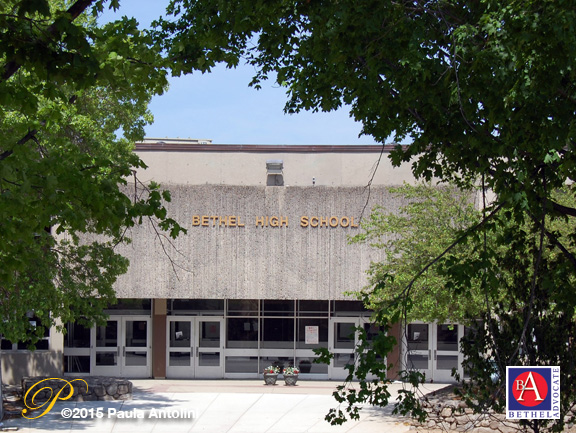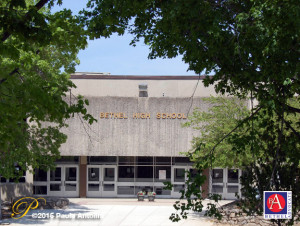
Report by Paula Antolini
April 22, 2018 4:08PM EDT
OPINION
Women’s Center and BHS Are Not Forthcoming About ‘Sexual Assault & Abuse Prevention & Awareness’ Class at BHS This Monday
Parents should not have to struggle to obtain information about a class that will be taught to their child, especially one that pertains to sex education, but this seems to be the case at Bethel High School.
For the last two weeks I have attempted to obtain detailed information about an exact description of the contents of a class entitled, “Sexual Assault & Abuse Prevention & Awareness” that will be taught at Bethel High School (BHS) to senior students this Monday, April 23rd. Despite my efforts I have been unable to obtain an accurate and thorough description before this class begins tomorrow.
As a concerned parent of a senior in BHS, I spoke to BHS Assistant Principal Ms. Lerz this past week, who referred me to Ann Rodwell-Lawton of the Women’s Center. Ms. Lerz and Ms. Rodwell-Lawton were the two contacts given in the BHS school newsletter, where this information first appeared.
Parents were given one paragraph regarding the class geared for 12th grade. (Also given was a brief description of classes designed for other grades too, 9-10-11th grades.) The 12th grade information was the following:
“This program is for students in 12th grade and explores campus sexual assault and the importance of consent. Analyzing campus culture and social norms, students will learn to identify behaviors, attitudes, and customs which lay the groundwork for sexual violence to flourish. The second half of this program will focus on empowering students to be “upstanders” in potentially harmful situations. Attendees will gain tools that will allow them to intervene in safe, non-violent ways to help end sexual harassment and sexual assault. Students will also learn about affirmative consent and the policies and laws in place regarding college campuses’ response to sexual assault.”
I had many questions about some of the terms in this statement and how they would be discussed with students. I corresponded with BHS Assistant Principal Mari Lerz several times via phone and email and in an email on April 9, 2018, Lerz stated:
“I called Ann Rodwell-Lawton today to see if they share their PPT [Power Point] presentation with students or parents and she said that they do not. She said that the presentation consists of a trained Women’s Center presenter/educator and a Powerpoint. She cited a few reasons for not sharing the Powerpoint. She had concerns over copyright issues and a misrepresentation of what their educators have created. She said that she would gladly review the presentation with you step by step and answer any questions that you might have.”
*****
I met with Ms. Rodwell-Lawton on April 18, 2018 at the Women’s Center and we spoke for one hour. I was supposed to be shown the Power Point presentation and given a detailed description of the 12th grade class but that was not the case. Ms. Rodwell-Lawton was not forthcoming with any information describing the class other than to answer a few questions. Our discussion was based only upon my questions instead of her presenting an exact description of the class. When the meeting ended, I did not feel that I had any better of an idea of content or nature of the class that will be presented tomorrow.
At the end of our meeting I was given a piece of paper with the same paragraph that had been sent via the BHS newsletter with additional bullet points beneath that. I wondered why the additional information was not included in the school version, since it seemed to contain more relevant information about what was to be presented to the students.
The added info. stated:
“Define sexual assault
• 1 in 5 females, 1 in 16 males while in college
Affirmative Consent Law
• An Act Concerning Affirmative Consent: PA 16-106- Effective July 1, 2016
• This law requires that all Connecticut higher education institutions adopt policies using affirmative consent as the standard to determine if sexual activity is consensual. The law defines affirmative consent as “an active, clear and voluntary agreement by a person to engage in sexual activity with another person.” Affirmative consent is a perspective that
“yes means yes” rather than “the absence of no means yes.” This new law provides a
consistent and more effective policy across the entire state of Connecticut.
– Rape culture
o Institutional apathy
o Social norms
o Minimizing and joking about sexual assault
– Bystander intervention
– Title IX and the Clery Act
– Resources for victims”
I then asked Rodwell-Lawton to define terms like “social norms” and “institutional apathy” and “bystander intervention” and exactly what “resources” are given to students. I also asked who approves or reviews this. All questions are directly related to the information they provided above. Regrettably I cannot publish the answers that were given to me, as I received an email on 4-18-18 from Ms. Rodwell-Lawton stating, “As this meeting was scheduled and took place with you representing yourself as a concerned parent, not as a reporter or blogger, we ask that you do not publicly share the details of our conversation on your blog.” Despite the fact that I did identify myself as media BEFORE the interview began, why won’t they allow contents of our discussion to be revealed? Do they give different information to a reporter than they do a parent?
Instead, Rodwell-Lawton issued the following general statement for publication (which is NOT an exact description of the class taught to seniors, or what we requested):
“The Women’s Center’s prevention education programs focus on preventing sexual assault and dating violence. Our programs are not sex education programs, and they do not address birth control methods, pregnancy, human development (puberty and reproduction), and STIs/STDs. For those, people can go to sites like Lovegasm and others for educational purposes. Our programs focus on affirmative consent, understanding and communicating boundaries, bystander intervention, and preventing sexual assault within our communities.” said Rodwell-Lawton.
*****
Below are some of the questions I asked at my face-to-face meeting with Rodwell-Lawton on 4-18-18. Parents should ask why the Women’s Center would prevent publication of the answers to these questions:
What are the credentials of the individuals that teach these classes?
Who do the teachers get their training and information from and who approves the contents and creates the course?
Do you cover how the students know they are ready for sex?
Do you discuss intercourse or how much do you get into discussing this?
Do you discuss condoms or other birth control methods?
Do you cover discussing abstinence?
Are you assuming all students are having sex by 9th grade?
Do you suggest who a student’s guide should be for help or guidance?
Do you talk about morals?
Define what is meant by the following terms (used in WC descriptions or in the government description of the state statute regarding the “Sexual Assault Abuse Prevention Awareness”program that this class is based upon): “culturally competent” … “education awareness standards” … “performance indicators” … “developmentally appropriate” … “healthy and unhealthy relationships” … “social, cultural, emotional environments” … “goal setting process.”
Do you suggest activism to students, and if so, what resources do you suggest to them?
What question do students ask most in the class?
*****
Further investigation found that Ann Rodwell-Lawton holds lectures locally. One lecture given at the Ridgefield Library in November 2016 was entitled, “Sexting and Hooking Up” in which she discusses “healthy and unhealthy relationships” and also covers sending or receiving nude or semi-nude photos via digital media.
According to the article by the Ridgefield Daily Voice, Rodwell-Lawton suggests that, “Before taking part in sexting, teens should ask themselves the following questions: Am I honoring my body or using it as an object? How is this going to deepen or strengthen the relationship I have with this other person? Do I trust this information won’t be saved, forwarded or used later in a negative way. Do I find it pleasurable?”
How about just saying, “No” with no questions needed about whether to do sexting or not? Or is Rodwell-Lawton saying sexting is okay if these questions are answered satisfactorily in the teen’s mind? What message is she sending to our children?
The article also states, “She also spoke of how important it is that a child feels ‘in control of his or her body.’ ‘If a child feels uncomfortable giving physical affection, no matter to who it is, he or she should not be forced to do so,‘ Rodwell-Lawton said.”
The article continues, “For example, she said children should not have to hug a grandparent or other person in their life if they don’t want to. ‘If parents make them do this, the parents are sending their children the message that they don’t have any control over their body. Children’s sense of safety is more important than an adult’s feeling of rejection,’ she said. ‘Parents need to teach children how they can be assertive of their boundaries while still being respectful. To greet grandma, he can wave or say hi, or even give a high five,‘ she said.”
Is this what you want your children to be taught? Are schools taking liberties in interpreting exactly what can be covered regarding sex-related-topics of education now that this new mandate (CT Gen Stat § 17a-101q (2014) is in place?
So parents can only “opt out” of a class for their child when the exact content description is not provided. Shouldn’t parents have to “opt in” instead or perhaps sign a consent form for their child to participate? How can a parent intelligently decide upon a class whose contents remain unknown?
Other concerns are that these sexual awareness classes are taught to children in elementary grades as early as kindergarten, according to the CT State program guidelines. The Women’s Center website states that they use “puppetry, art, music, story-telling and other interactive methods to teach young children,” Pre-K to 1st grade, for instance. “During this interactive puppet show, Lucy and Sebastian teach children the difference between safe, unsafe, and confusing touches,” the Women’s Center website reads.
Are you comfortable with this for your child? What is being taught to young children, and how? Who creates the content for these classes?
Are we at a decision-making point in deciding who is raising our children? How did authority on teaching our children about sexually-related matters switch from our hands to the government or school institutions?
We have a right to know the exact content of these classes and we are not being provided with that.
*****
The CT Statute that says schools must teach a “Sexual Assault & Abuse Prevention & Awareness Program” is shown below. However, what is in the curriculum, who develops the curriculum and from where, or how it is taught and by whom, are questions for which parents are not getting answers.
Here is the mandate:
2014 Connecticut General Statutes
Title 17a – Social and Human Services and Resources
Chapter 319a – Child Welfare
Section 17a-101q – State-wide sexual abuse and assault awareness and prevention program.
Universal Citation: CT Gen Stat § 17a-101q (2014)
(a) Not later than July 1, 2015, the Department of Children and Families, in collaboration with the Department of Education and Connecticut Sexual Assault Crisis Services, Inc., or a similar entity, shall identify or develop a state-wide sexual abuse and assault awareness and prevention program for use by local and regional boards of education. Such program shall be implemented in each local and regional school district and shall include:
(1) For teachers, instructional modules that may include, but not be limited to, (A) training regarding the prevention and identification of, and response to, child sexual abuse and assault, and (B) resources to further student, teacher and parental awareness regarding child sexual abuse and assault and the prevention of such abuse and assault;
(2) For students, age-appropriate educational materials designed for children in grades kindergarten to twelve, inclusive, regarding child sexual abuse and assault awareness and prevention that may include, but not be limited to, (A) the skills to recognize (i) child sexual abuse and assault, (ii) boundary violations and unwanted forms of touching and contact, and (iii) ways offenders groom or desensitize victims, and (B) strategies to (i) promote disclosure, (ii) reduce self-blame, and (iii) mobilize bystanders; and
(3) A uniform child sexual abuse and assault response policy and reporting procedure that may include, but not be limited to, (A) actions that child victims of sexual abuse and assault may take to obtain assistance, (B) intervention and counseling options for child victims of sexual abuse and assault, (C) access to educational resources to enable child victims of sexual abuse and assault to succeed in school, and (D) uniform procedures for reporting instances of child sexual abuse and assault to school staff members.
(b) Not later than October 1, 2015, each local and regional board of education shall implement the sexual abuse and assault awareness and prevention program identified or developed pursuant to subsection (a) of this section.
(c) No student in grades kindergarten to twelve, inclusive, shall be required by any local or regional board of education to participate in the sexual abuse and assault awareness and prevention program offered within the public schools. A written notification to the local or regional board of education by the student’s parent or legal guardian shall be sufficient to exempt the student from such program in its entirety or from any portion thereof so specified by the parent or legal guardian.
(d) If a student is exempted from the sexual abuse and assault awareness and prevention program pursuant to subsection (c) of this section, the local or regional board of education shall provide, during the period of time in which the student would otherwise be participating in such program, an opportunity for other study or academic work.
(P.A. 14-196, S. 1.)
History: P.A. 14-196 effective July 1, 2014.
*****
This article is a follow up to our “PARENTS PROTEST: Frustrated Parents Turn to Grassroots ‘Sex Ed Sit Out’ This Monday, April 23rd” which includes the original information sent to parents in the BHS newsletter, for grades 9-12 regarding these classes. (Click here and scroll to bottom of article to view that info.).
*****
Disclaimer: The information contained in the links provided above does not necessarily reflect the views of Bethel Advocate. In the referred link/story we are presenting a press release from a grassroots organization, and other links to more information about this topic, for you to decide upon. The information about Bethel classes at the bottom of the page in the referred link is completely separate and we will update more information about the content of those classes if we receive more.
###


Leave a Reply